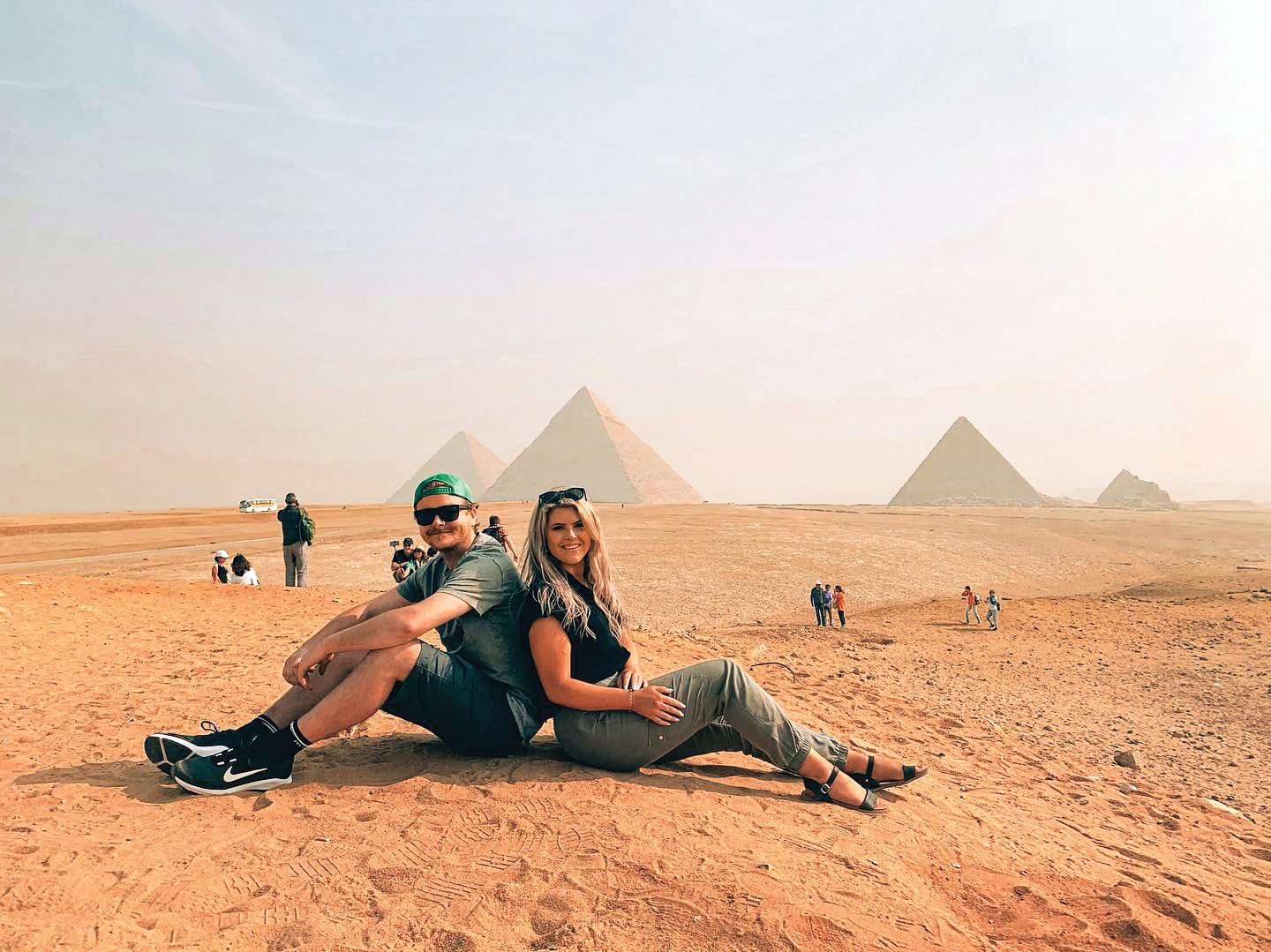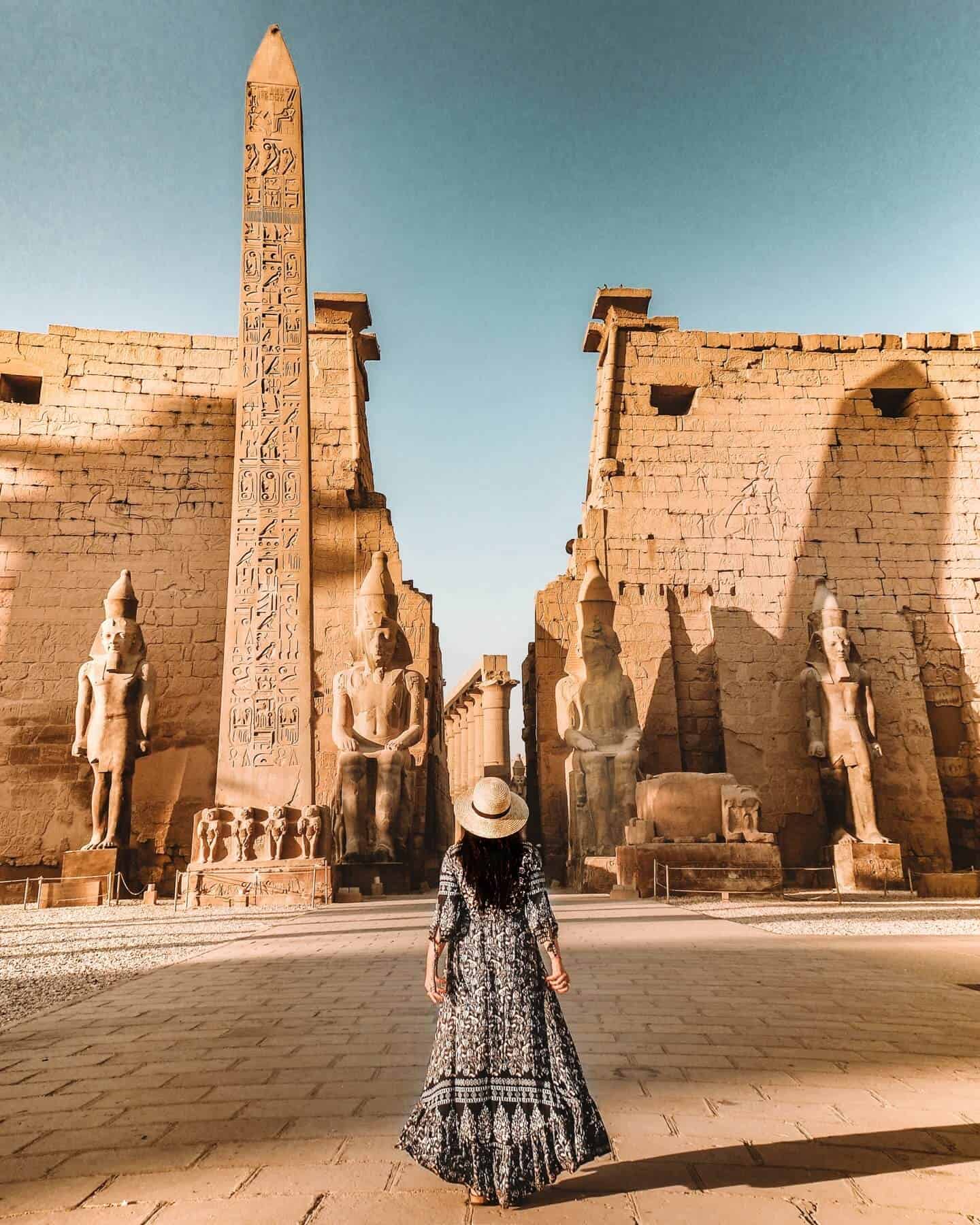The Ultimate Adventure: 8 Days in Egypt for South African Travellers

Overview of Egypt as a Travel Destination
Geography and Climate
Egypt, often referred to as the "Gift of the Nile," is a land of captivating landscapes and ancient history. It is predominantly characterised by its vast desert regions and the iconic Nile River, which flows through the heart of the country. This fascinating contrast creates a unique geographic tapestry, making it a compelling destination for every kind of traveller.
- Regions:
- Cairo: Bustling capital known for its rich history and modern urban life.
- Nile River: The longest river in the world, perfect for river cruises.
- Giza: Home to the Pyramids, showcasing the brilliance of ancient Egypt.
- Red Sea Coast: Renowned for its stunning coral reefs and resorts.
The climate varies dramatically; the coastal areas enjoy a Mediterranean climate, while the interior predominantly experiences a hot desert climate. The best time to visit is between October and April, when temperatures are milder and more conducive to exploring.
Cultural Highlights
The cultural richness of Egypt is nothing short of extraordinary, blending ancient traditions with modern vibrancy. From the awe-inspiring monuments that dot the landscape to the bustling souks, there's an experience waiting for you at every corner.
- Historical Sites:
- Pyramids of Giza: A must-see, these ancient marvels never fail to impress.
- Luxor Temple: A glimpse into Egypt's past with breathtaking architecture.
- Karnak Temple: The largest religious building ever constructed, showcasing incredible art and history.
- Local Life: Visiting local markets and engaging with the hospitable Egyptians will provide insights into their traditions and lifestyle.
These cultural highlights truly immerse you in the essence of Egypt, making it more than just a destination; it's an adventure into a rich tapestry of history and community. Prepare to be amazed!

Planning Your Trip to Egypt from South Africa
Visa Requirements
When planning your trip to Egypt from South Africa, one of the first things to tackle is your visa. Fortunately, obtaining an Egyptian visa is a straightforward process, making your journey smoother before it even begins. As a South African citizen, you generally have two options:
- Visa on Arrival: You can get a visa upon arriving at any international airport in Egypt.
- E-Visa: Apply online for an e-visa in advance, which is convenient and saves you time at the airport.
Make sure to have the following handy:
- A valid passport with at least six months' remaining validity
- A recent passport-sized photo
- Proof of accommodation in Egypt
It's wise to check the latest updates on visa regulations, as these can change based on government policies.
Travel Insurance Considerations
Equally important is securing travel insurance before your Egyptian adventure. While exploring ancient temples or cruising down the Nile, you want to ensure you’re covered for any unexpected events. Here are a few key aspects to consider when choosing your insurance policy:
- Medical Coverage: This is crucial; ensure your insurance covers medical emergencies, including hospitalization and evacuation.
- Trip Cancellation: Look for options that accommodate unforeseen cancellations due to illness or travel disruptions.
- Adventure Activities: If you plan to indulge in activities like scuba diving or hot air ballooning, check that your policy covers these.
Investing in travel insurance provides peace of mind, allowing you to enjoy your trip without worrying about what might go wrong. Plus, it shows you’re well-prepared right from the start!

Day-by-Day Itinerary for an 8-day Adventure
Day 1: Arrival in Cairo
Welcome to Cairo! As you touch down at Cairo International Airport, the excitement of discovering this vibrant city fills the air. After checking into your hotel and refreshing yourself, embark on a leisurely evening stroll around your surroundings. Perhaps enjoy a traditional meal at a local restaurant, indulging in dishes like koshari or grilled kebabs.
Day 2-3: Exploring the Pyramids of Giza
Your adventure truly begins as you set out to explore the Pyramids of Giza. Spend your first day immersing yourself in the wonders of these iconic structures. Be sure to:
- Capture breathtaking photos at the Great Pyramid.
- Visit the Sphinx and learn about its fascinating history.
On Day 3, consider a camel ride around the pyramids for a unique perspective. You might also want to visit the Solar Boat Museum for an insight into ancient Egyptian burial traditions.
Day 4-5: Cruising the Nile River
On Day 4, board a luxurious Nile cruise that will sweep you away on serene waters. Spend your days visiting charming riverbanks, discovering temples and enjoying onboard entertainment. Don't miss the chance to:
- Stop at Kom Ombo and Edfu, home to fascinating temples.
- Relax on deck as you watch the sunset over the river.
Day 6: Luxor and Valley of the Kings
Disembark in Luxor and explore the Valley of the Kings. This UNESCO World Heritage site is the burial ground of ancient pharaohs. You’ll be awestruck by the elaborate tombs and their well-preserved art. Be sure to visit King Tutankhamun’s tomb for a unique experience steeped in history.
Day 7: Red Sea Relaxation in Hurghada
After a whirlwind of sightseeing, it’s time to unwind in Hurghada on the Red Sea. Spend your day lounging on beautiful beaches or snorkelling in crystal-clear waters, surrounded by colourful marine life. This is a perfect opportunity to rejuvenate and soak up the sun.
Day 8: Back to Cairo and Departure
On your final day, return to Cairo for some last-minute shopping or sightseeing. Visit the bustling Khan el-Khalili bazaar to pick up souvenirs and enjoy the local ambience. As you prepare to board your flight home, reflect on the unforgettable memories and experiences from your incredible journey through Egypt!

Budgeting and Costs for South African Travelers
Accommodation Options
When planning your Egyptian adventure, knowing your accommodation options can help you tailor your stay to fit your budget. Fortunately, Egypt offers a wide range of choices suitable for every traveller, from backpackers to luxury seekers.
- Budget Hotels/Hostels: If you're looking to save, budget options start from around ZAR 200-400 per night. These provide basic amenities but are often centrally located, allowing you to explore without spending too much.
- Mid-Range Hotels: For a little more comfort, consider mid-range hotels which typically charge between ZAR 600-1200 per night. These often have additional facilities like pools, breakfast included, and better service.
- Luxury Resorts: If you want to indulge, luxury resorts can range from ZAR 2000 upwards per night. Places like the Four Seasons or Ritz-Carlton provide a lavish experience with stunning views and world-class amenities.
Food and Transportation Expenses
Food and transportation will also play a significant role in your overall budget. Egyptian cuisine is both delicious and affordable, allowing you to enjoy local flavours without breaking the bank.
- Dining Out:
- Street food can cost as little as ZAR 30-50 for a filling meal, like falafel or a classic shawarma.
- Sit-down meals at restaurants range from ZAR 100-400, depending on the location and cuisine.
- Transportation:
- Public transport, such as the metro in Cairo, is incredibly affordable, with fares costing less than ZAR 10.
- Taxis and ride-sharing services like Uber are also available and relatively inexpensive, typically costing around ZAR 70-150 for short distances.
By carefully considering your accommodation, dining, and transportation options, you can make the most of your Egyptian adventure while sticking to your budget, leaving you with extra funds for shopping or excursions. Get ready to experience the magic of Egypt without overspending!

Cultural Etiquette and Tips for Traveling in Egypt
Dress Code and Behavior
As you embark on your Egyptian adventure, being mindful of the local dress code and behaviour is essential. Egypt is a Muslim-majority country, and modesty is key in public spaces. Here are some tips to help you blend in:
- For Women:
- Wear clothing that covers your shoulders and knees. Long skirts or trousers paired with long-sleeve tops are ideal.
- Scarves can be handy, especially when visiting religious sites like mosques.
- For Men:
- Dress modestly by avoiding shorts. Lightweight trousers and short-sleeve shirts are appropriate.
Remember to remove your shoes when entering homes or mosques, as it is customary. A polite smile and a friendly greeting can go a long way; you may find that a simple “Salam” (hello) opens doors to warm interactions with locals.
Local Customs and Traditions
Understanding local customs enhances your travel experience. Egyptians are known for their hospitality and friendliness, so don’t be surprised if you receive warm welcomes.
- Dining Etiquette:
- When invited to someone’s home, it’s customary to bring a small gift, such as fruit or sweets.
- Always use your right hand for eating and giving, as the left hand is considered unclean.
- Social Interactions:
- Expect to engage in friendly conversations, often starting with inquiries about your health and well-being.
- Personal space is often closer than in Western cultures, so relaxed body language works well.
Participating in local customs not only shows respect but also deepens your connection with the culture. As you navigate through Egypt, these cultural tips will make your interactions more meaningful and enjoyable, allowing you to experience the rich tapestry of Egyptian life to the fullest.

Safety and Health Precautions for Travellers
Vaccinations and Health Insurance
When travelling to Egypt, taking precautions related to your health is essential for a worry-free trip. Before your adventure, consult your healthcare provider regarding recommended vaccinations. Common vaccinations that may be recommended include:
- Hepatitis A and B: These are critical due to possible exposure through food and water.
- Typhoid: Particularly if you plan on venturing off the beaten path.
- Tetanus-Diphtheria: Keep your immunisations up-to-date for overall safety.
Additionally, securing comprehensive travel health insurance is a smart move. This should cover emergency medical situations, including hospital visits and repatriation, giving you peace of mind as you traverse the historical wonders of Egypt.
Tips for Staying Safe in Egypt
Safety should always be a priority, and with some simple precautions, you can enjoy your journey without worry:
- Stay Informed: Keep an eye on travel advisories from your government and listen to local news. It’s wise to stay aware of any areas to avoid.
- Use Reputable Transportation: Opt for registered taxis or ride-sharing apps like Uber for ease and safety. Always negotiate fares before getting into a taxi if you're not using a ride-share.
- Keep Belongings Secure: Use anti-theft bags and be mindful of your surroundings in crowded areas such as markets. Avoid displaying expensive jewellery or equipment.
- Respect Local Customs: As mentioned previously, understanding and following cultural norms can prevent misunderstandings and enhance your experience.
By taking these safety and health precautions, you'll ensure that your trip to Egypt is not only memorable but also safe, allowing you to focus on enjoying the breathtaking sights and rich culture this remarkable country has to offer. Safe travels!

Must-Try Egyptian Food and Dining Experiences
Traditional Dishes to Sample
No trip to Egypt is complete without diving into its rich culinary landscape. Egyptian cuisine is a diverse blend of flavours and textures, ensuring that each meal is a delightful experience. Here are some must-try traditional dishes that you absolutely cannot miss during your visit:
- Koshari: This iconic Egyptian street food consists of rice, lentils, pasta, and a spicy tomato sauce topped with crispy onions. It's hearty, filling, and incredibly affordable—perfect for a quick lunch on the go.
- Falafel: Made from ground chickpeas, falafel is deep-fried to perfection and is often served in pita bread with fresh vegetables and tahini sauce. It’s a vegetarian’s delight, full of flavour and crunch.
- Molokhia: A unique green soup made from the jute plant, it’s often served with rice and chicken or rabbit. The velvety texture and tangy flavour are unlike anything you’ve tasted before.
- Shawarma: Though popular across the Middle East, Egyptian shawarma is something you must try. Thinly sliced meats cooked on a vertical rotisserie served with garlic sauce and pickles, it’s a quick bite that packs a punch.
Popular Local Restaurants to Visit
To savour these delightful dishes, here are some local restaurants that will elevate your dining experience:
- Abou Tarek: Renowned for its koshari, this bustling eatery is famous for serving the best in Cairo. The energy and aroma are sure to entice you.
- El-Fishawy: Nestled in the heart of Khan el-Khalili bazaar, this cafe offers a unique ambience, serving delicious falafel alongside aromatic mint tea—the perfect pit stop after a day of exploring.
- Felfela: A great place to try various Egyptian dishes, including classic shawarma. The vibrant decor and friendly waitstaff create a welcoming atmosphere.
Embrace your culinary adventure in Egypt by sampling these traditional dishes and dining at local hotspots. Eating like a local not only feeds your body but enriches your experience, connecting you to the heart and soul of Egyptian culture. Enjoy every bite!

Souvenirs and Shopping Recommendations
Best Places to Buy Authentic Egyptian Goods
As your Egyptian adventure nears its end, securing some authentic souvenirs is a great way to preserve the memories of your trip. Fortunately, Egypt is a treasure trove of unique items that reflect its rich history and culture. Here are some of the best places to shop for authentic goods:
- Khan el-Khalili Bazaar: This iconic market in Cairo is a must-visit. With its narrow alleys filled with colourful shops and stalls, you can find everything from handcrafted jewellery to traditional textiles. Don’t forget to bargain—it’s part of the experience!
- Aswan Souk: Known for its vibrant atmosphere, the Aswan market offers a variety of crafts, spices, and local art. Unique handmade goods like carpets and pottery make for perfect souvenirs.
- Luxor Market: While exploring Luxor, visit the local market for papyrus art. Hand-painted papyrus scrolls make for an exquisite and lightweight souvenir to decorate your home.
Cultural Souvenirs to Bring Back Home
When it comes to picking the right souvenirs, consider items that genuinely capture the essence of Egypt. Here are some cultural treasures to look out for:
- Papyrus Scrolls: These ancient manuscripts often depict Egyptian mythology or hieroglyphics and can add a touch of history to your décor.
- Wooden Carvings: Look for intricately carved wooden figurines or replicas of pharaohs. They are not only beautiful but also tell a story.
- Egyptian Spices: Bring home a selection of spices, such as saffron and hibiscus, to elevate your culinary creations.
By shopping at these local markets and picking out cultural souvenirs, you’ll not only support local craftsmen but also create lasting memories of your journey. Each item you bring back will serve as a reminder of the vibrant culture and history you experienced in Egypt. Happy shopping!
